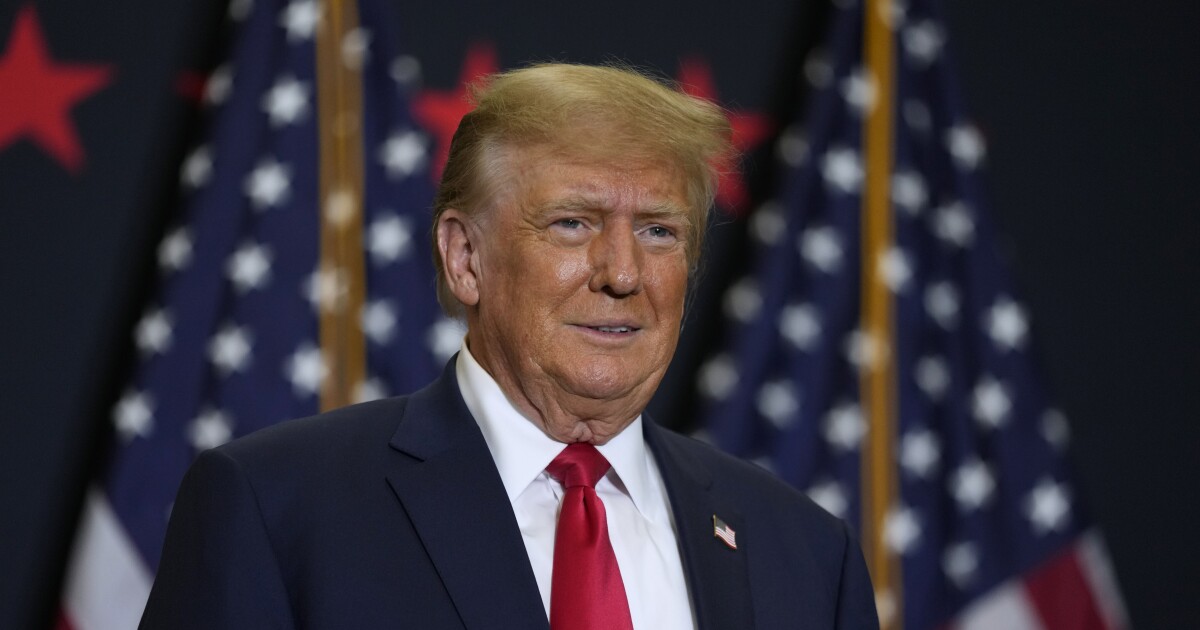

The start of January marks a new phase for former President Donald Trump‘s legal calendar, as several key dates will determine the trajectory of his eventual criminal trials as the 2024 election season ramps up.
Beginning Jan. 15, the primary voting season will begin with the caucuses in Iowa, followed by New Hampshire voters weighing in on who should be the Republican presidential nominee on Jan. 23.
TWELVE DAYS OF WEX-MAS: IMPEACHMENT INQUIRY BECOMES 2024 LIGHTNING ROD
While Gov. Ron DeSantis (R-FL) and former United Nations Ambassador Nikki Haley are the two candidates likeliest to give Trump a stiff challenge in the GOP primary race, Trump has long maintained a significant lead in polling that has only been amplified by his four criminal indictments.
Those criminal cases will consequently force the former president to campaign on a tight schedule, between the legal calendar and key primary dates.
Here are the most important courtroom dates Trump faces in the month ahead.
Jan. 4: Deadline to appeal Colorado’s decision to nix Trump from ballot
The Colorado Supreme Court handed Trump a novel legal headache on Dec. 19 when it ruled in a 4-3 decision that Trump was disqualified from appearing on the state’s primary ballot under the 14th Amendment.
Challengers to Trump’s eligibility argued Section 3 of the 14th Amendment prevents people from holding office if they have “engaged in insurrection or rebellion.” Four justices on the state Supreme Court found that Trump did incite and engage in insurrection with his repeated statements that the 2020 election was stolen from him, ruling that that rhetoric led to the Jan. 6 riot at the U.S. Capitol.
Justices in Colorado automatically stayed their ruling until Jan. 4 because, with the primary voting date slated for March 5, the state will be finalizing and printing ballots on Jan. 5.
Trump is expected to file a petition to the U.S. Supreme Court in the coming days.
Jan. 9: Trump immunity argument heads to appeals court
The Supreme Court decided on Friday it will not, for now, hear a case on Trump’s presidential immunity defense after special counsel Jack Smith asked the justices to weigh that claim on an expedited schedule.
Trump has long maintained he is immune to the prosecution by Smith in Washington, D.C., where Smith filed a four-count indictment alleging Trump conspired to overturn the 2020 election and deprive voters of their right to have their ballots counted. Smith contends that Trump’s efforts to overturn the election went beyond his duties as president.
“The Constitution establishes a powerful structural check to prevent political factions from abusing the formidable threat of criminal prosecution to disable the President and attack their political enemies,” Trump’s attorneys wrote in a filing on Saturday.
A three-judge panel on the U.S. Court of Appeals for the District of Columbia Circuit has agreed to weigh this dispute during oral arguments set for Jan. 9. The losing party in that case could ask the full appeals court to rehear the case. In the end, the losing side will likely return to the Supreme Court for a final verdict.
U.S. District Court Judge Tanya Chutkan agreed to set the jury trial for Trump on March 4. Because the trial is paused while the appeals court considers Trump’s immunity defense, legal experts say that the trial date will, in all likelihood, be pushed back by at least a few weeks due to the delays.
Jan. 11: Trump civil fraud trial begins closing arguments
A civil fraud trial against the Trump Organization does not pose the same legal risks as Trump’s four criminal cases, but it threatens severe damage to his reputation and ability to do business in New York.
Judge Arthur Engoron has already issued a summary judgment holding that Trump and his family made fraudulent claims while conducting business in the Empire State. Some of the deceptive practices included inflating the value of assets to gain more favorable terms on loans, and the weekslong trial has focused on what penalties should be levied on the former president’s real estate empire.
Engoron has told both sides in the case, which was brought by Democratic New York Attorney General Letitia James, to file written submissions by Jan. 5. Closing arguments are set to begin on Jan. 11.
Jan. 15: 2019 defamation suit from E. Jean Carroll goes to trial
Trump is slated to go on trial on Jan. 15 in Manhattan federal court to determine how much in damages he owes to writer E. Jean Carroll for calling her a liar and disparaging her when he denied he raped her in the mid-1990s.
The lawsuit was filed in November 2019 over comments he made shortly after Carroll publicly accused him of the rape incident. It was on hold for some time due to a previous position by the Justice Department that Trump couldn’t be held liable for comments he made while he was in office, but President Joe Biden‘s DOJ retracted that position earlier this year.
CLICK HERE TO READ MORE FROM THE WASHINGTON EXAMINER
Trump is also using an immunity defense in the civil defamation case. Defense attorney Alina Habba asked an appeals court earlier this month to give Trump 90 days to consider his options and to pause the trial indefinitely until all appeals are exhausted, signaling Trump could try to appeal all the way to the Supreme Court in this case as well.
Carroll had already succeeded in a separate but related lawsuit in May that alleged defamation and battery, and she was awarded $5 million in damages. Trump is appealing that case.





